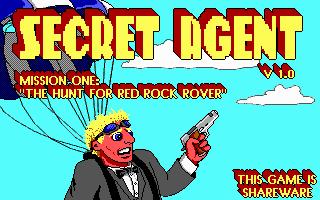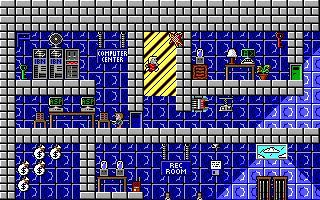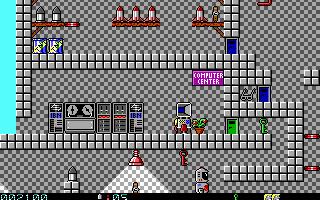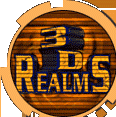The Apogee Legacy #15 - Peder Jungck
 Today our "Apogee Legacy" Interview series continues on with an interview with Peder Jungck (pronounced 'junk'). Peder was responsible for the 1992 title, "Secret Agent" with us.
Today our "Apogee Legacy" Interview series continues on with an interview with Peder Jungck (pronounced 'junk'). Peder was responsible for the 1992 title, "Secret Agent" with us.
Secret Agent was Peder's only title with us. It was a cool little game that yours truly bought before he started working here all those years ago. :) Anyway, it's a game where you play Secret Agent 006 1/2 on a mission into the secret island fortress of the DVS. Secret Agent, along with Crystal Caves are believed to be the #1 & #2 record holders for time elapsed between original release and a maintenance patch release. For Secret Agent it was just about 14 years between it coming out, and us releasing a patch for it in October of 2005.
Peder is no longer making games, and was a little harder to track down than most of the folks for this series, but we're glad we did. We haven't spoken with Peder in several years, and as you will find out by reading his interview below, he was more than happy to contribute. In fact, Peder wrote probably the longest entry in terms of words for the series. It's a great read, covering all kinds of stuff.
Past Pioneers of the Shareware Revolution
Issue #15 - Peder Jungck
1) How did you first come in contact with Apogee?
In the late 80's I wrote a graphics package for the Zenith-100 (pre-PC & EGA days) that was used for many of my early games on that platform. When the EGA video adapters started driving decent graphics in the PC I ported my libraries and developed a commercial product called the ProGraphx Toolbox. I advertised these tools in Programmer's Journal and wrote several articles on graphics programming. George Broussard was running MicroFX and had purchased the ProGraphx Toolbox and contacted me about doing some enhacements to the library. As it turned out, I had just recently moved from Chicago to Arlington Texas, not too far from George in Garland. We got together one day at a Chili's to discuss the requirements and it grew from there.
2) Was there a reason you decided to work with Apogee, say versus going on your own or working with another company?
I had developed games ever since I was 10 on platforms like the Commodore Pet & VIC-20, Apple II & Mac and Zenith-100. I had my own companies, published through bigger companies and at times worked with small incredibly talented teams. Having experienced some of each I have come to the conclusion that the best things happen when you find a group of incredibly talented people driven with a vision. George and Apogee were just such a group. When you meet great people with vision, your decision is not about some calculated move of which company but rather one of excitement and fulfillment of goals. So, if I were to place one reason of why Apogee, it was all about the team.

|
| Title screen for Secret Agent |
3) Looking back, was there anything Apogee could have done better, regarding the marketing and distribution of your game?
I had a great experience with Apogee and thier ability to market. In the days of bulletin boards and emergence of Shareware in packaging at the computer stores I felt like my game was in front its target audience. Within the first few months the sales started ramping up and response was positive. Secret Agent did very well in its first year and if there were anything they could have done better, it would have been to kick my tail to have gotten it out a lot sooner as it was on the tail end of the side scroller generation. In actuality, without the marketing genius of Apogee to develop the 3 episode shareware approach where episode 1 was free and 2 & 3 cost money shareware marketing was a bust. Additionally, the development of cheat codes in every game with access only through purchase made it as captivating as an infomercial today. Apogee had the best marketing in the shareware gaming space hands down.
4) Do you think your game was made better or worse by working with Apogee?
Definitely a better product. Apogee drove the quality of the game play, pushed for high quality graphics and did extensive quality assurance testing to ensure compatibility and in those days completability of the game. We found issues where certain EGA cards didn't pan thier graphics smoothly and had to make modifications to support each. Apogee brought in artists to do opening cover art and upgraded the icon and pixel graphics for smooth character movements. Apogee invested in each developer and each product extensively in a tight relationship more so than the publishers of the day.

|
| Peder in 1992 |
5) Apogee had a policy of letting the designer or studio retain full intellectual property rights to their game. Nowadays, it's rare to find a publisher who allows this, especially if the publisher is providing the funding. Do you believe that it's best for the creator to retain IP rights? Why or why not?
I do believe that it is important for game developers to retain rights to thier work. In many ways this is an art and one does not want to constrain an artist. That said I think that the IP rights issue in the early days was a bit different than it is today. For one, the product was often created by an individual or a small team. Today, it often can take dozens or even more than a 100 for big title. Second, gaming has become big business and as such intellectual property protection, lawsuits, cross-promotion deals and branding is expensive. I think that an individual won't be able to fully maximize the potential of thier intellectual property value today as they did then. I believe that the choices by Apogee in the early days of PC gaming was the right choice and part of thier success. I am not sure that I believe that this is the best choice today for either the publishers or designers.
5a) And if applicable, have you benefited from retaining ownership of your own IP?
I have benefited in two ways. First, it brings a peace of mind. I have often thought of playing with the software to experiment with gaming on other platforms. I know this code (although not well anymore) so it always seems easier to take an existing code base to try something rather than start from scratch and know that you are potentially violating an agreement. The second way is that I have watched the resurgence of casual gaming on devices like PDA's and cell phones. I truly believe there is an opportunity for the revitalization of the Apogee phenominon that occurred pre-3D on portable devices. Having a say in this option is valuable.
5b) Do you think there'll ever be a sequel to your game(s)?
Sure, if not we close the door and every great trilogy needs to leave the door open. On the PC, I would doubt it unless it was written by one of my sons and fortunately that's not too far out of the question. If there is, I would see it on a cell phone. Besides that is more Secret Agent 006 1/2's size. :>
6) Is there any story/incident that stands out as interesting during your time associated with Apogee?
While I recall many long nights on the phone and transferring files and bug lists it was the social times that are most memorable. Being a car guy, I must say that high end cars have always been a big motivation in life. I recall meeting with George driving my 4-cylinder mustang and he had an old camaro. One day as things were starting to pick up for Apogee and George tempting me with the fruits I would see when my game shipped, he showed up with a bright red Acura NSX. Mind you in the early 90's in the wake of depressing cars from the big 3, this was an almost iconic vehicle. There is no low end version of an NSX, it was pure race technology design from the ground up. Getting to drive that car provided a memory I will never forget and it drove me to finish my game fast. Net result, spend most of my first few months sales on my Saleen Mustang and a 1966 Mustang painted to match. Every time I see an NSX I think of Apogee even today.

|
| Secret Agent Screenshot |
7) Apogee was an early pioneer in terms of teaming up with external designers and studios, and continues to do so even to this day (currently working with Human Head Studios on Prey). Why is it that so few other studios do this (mentor and fund outside projects with lesser known teams)?
I think that to be successful at this the business leaders need to be gamers, passionate, involved and savvy business people all in one. This is a rare combination to find in a small group of individuals. It also needs to be part of the culture from day one. Apogee was a special place that resulted in special products.
8) What the biggest difference in the industry nowadays versus when you worked with Apogee?
Shortly after my Secret Agent days with Apogee, I went from building games on the side to doing gaming for full-time business. TerraGlyph Interactive, a CD-ROM edutainment company I helped start, was one of the first of the big business venture capital based mega game companies. In a matter of a few years in the 90's, the scale of titles went from a few developers over the course of a year to a title I directed and produced, Beowulf, had over 200 people-years of effort to product and millions of dollars. I have heard that the gaming industry is driving more revenue than movies in some categories and the technology required to develop has become increasingly complex. Just like the Internet has gone from a government and university experiment to the change of a culture, gaming has gone from its small text based adventures to massively multiplayer games that are leading to online dating and marriage. This is a night and day difference, however, deep inside these organizations, there is still the passionate gamers spending late hours coding and drinking Mountain Dew. That is the industry I miss and still look for because it contains the heart of what will always keep gaming on the top of the entertainment charts.
9) What have you been doing since your time with Apogee?
Building and playing games was a passion as a kid and a sideline through college and afterwards bringing in lots of enjoyment and money for college bills and cars. After Apogee I published a book on gaming, Graphics Programming and Animation, that was one of the first for PC gaming that was very successful for me. I then went into gaming full-time for the first time ever with TerraGlyph that ran for 3 years before the big game systems and Internet revolution changed gaming from CD-ROM onto its next phase. TerraGlyph got me hooked on big Venture backed startups in my home turf of networking and high end computing. I have continued to do startups since 1997 running a IT Consulting and Systems Integration house in Chicago, taking the role of CTO at yesmail.com which we took public in 1999 and then starting CloudShield Technologies in 2000 which develops supercomputers for the network that are sold to the service providers and government. I spend most of my time solving multigigabit problems for processing applications such as VoIP and Security on the Internet.
10) If you're no longer making games, have you thought about returning to this industry? If not, why not?
Sure. Once a gamer, always a gamer and every time something new comes up you can't help but think of the good times. Ideas continuously pop up that makes me think about how to find the time to do just one more foray into gaming. I gotta tell you, mobile phone look just like an old 286 with EGA to me perfect for those old side scrollers. Maybe I could use this forum to announce Secret Agent for Windows Mobile?

|
| Secret Agent Screenshot |
11) Looking back, are there any missed opportunities that you wish you'd have jumped on?
Sure. I watched the 3D events unfold before my eyes and even had an engine built in 93 that if I had jumped on could have done well. Do I have regrets, no way. The real-time programming and detailed hardware knowledge I learned in bit blasting the EGA/VGA gave me an understanding of computing that has formed a basis of what I do today. In many ways we all make decisions that we can never be sure of the alternatives, however, I am happy with the outcome and to have been part of Apogee during some magical years.
12) Other than your game(s), what's your favorite game released or produced by Apogee (or 3D Realms)?
I must admit that Duke Nukem titles were always my favorites. Even the side scrollers before the 3D. They were easy to jump into and just have a great time blasting away.
12a) And what's your favorite 2-4 games released by anyone else?
As I said earlier, I like cars and as such car games are some of my favorites that I go back to over the years. Twisted Metal on the Playstation, Rage Racer and now Need for Speed Underground for the PSP have gotta be at the top of the list.
13) Is there anything else you'd like to add about your time here or to fans of your title(s)?
Apogee is one of the few gaming companies still around which embodies the true essence of what gaming companies are all about. I just would like to thank the devoted followers of Apogee, Secret Agent and the titles I provided graphics engines for. In the world of mega gaming companies supporting independent player such as Apogee is what will keep the big guys honest and the game quality highest possible. Some day in the future, I hope to return to the gaming world in a more active fashion and its great time spent remember the early days.


Thanks again to Peder for helping out. We still sell his game almost 15 years later, and it's a cool fun game, so check it out with the links below:
- Our Secret Agent Catalog Page
- Shareware Episode of Secret Agent
- Secret Agent Page in our Online Store
- Wikipedia Entry for Secret Agent
- Cloudshield Technologies (where Peder works now)
Make sure and tune in again next Monday morning, when we bring you the next in our Legacy Interview series.
Posted by Joe Siegler on April 17, 2006 at 12:00 PM | Permalink
| Discuss this story on our forums
News Categories: About 3DR / 3DR Staff | The Apogee Legacy






